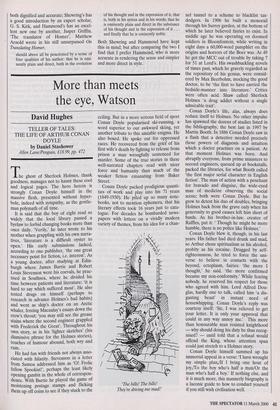More than meets the eye, Watson
David Hughes
TELLER OF TALES: THE LIFE OF ARTHUR CONAN DOYLE by Daniel Stashower Allen LanelPenguin, f18.99, pp. 472 The ghost of Sherlock Holmes, thank goodness, manages not to haunt these cool and logical pages. The hero herein is strongly Conan Doyle himself in the massive flesh, presented without hyper- bole, indeed with sympathy, as the gentle- man polymath of all time. It is said that the boy of eight read so widely that the local library passed a byelaw to forbid changing books more than once daily. 'Verily,' he later wrote to his mother when grappling with his own narra- tives, 'literature is a difficult oyster to open.' His early submissions lacked, according to one publisher, 'the one great necessary point for fiction, i.e. interest'. As a young doctor, after studying at Edin- burgh where James Barrie and Robert Louis Stevenson were his coevals, he prac- tised in Southsea, where he divided his time between patients and literature; 'it is hard to say which suffered most'. He also tested drugs on himself (perhaps to research in advance Holmes's bad habits) and went as ship's doctor on an Arctic whaler, forcing Macaulay's essays down the crew's throat; `you may still see the grease stains where the second engineer grappled with Frederick the Great'. Throughout his own story, as in his 'lighter sketches' (his dismissive phrase for the Holmes stories), touches of humour abound, both wry and rum.
He had fun with friends not always asso- ciated with hilarity. Stevenson in a letter from Samoa addressed him as '0! Frolic fellow Spookistr, perhaps the least likely opening gambit in the whole of correspon- dence. With Barrie he played the game of moistening postage stamps and flicking them up off coins to see if they stuck to the ceiling. But in a more serious field of sport Conan Doyle popularised ski-running, a word superior to our awkward skiing, yet another tribute to this amiable enigma. He also boxed. He spoke out for oppressed races. He recovered from the grief of his first wife's death by fighting to release from prison a man wrongfully sentenced for murder. Some of the true stories in these well-narrated chapters read with nicer force and humanity than much of the weaker fiction emanating from Baker Street.
Conan Doyle packed prodigious quanti- ties of work and play into his 71 years (1849-1930). He piled up so many note- books, not to mention ephemera, that his literary effects took 16 years just to cata- logue. For decades he bombarded news- papers with letters on a vividly modern variety of themes, from his idea for a chan- `The bills! The bills! They're driving me mad!' nel tunnel to a scheme to blacklist tax- dodgers. In 1906 he built a monorail through his Surrey garden, at the bottom of which he later believed fairies to exist. In middle age he was operating on doomed soldiers in Bloemfontein, while writing in eight days a 60,000-word pamphlet on the origins and horrors of the Boer war. At 49 he got the MCC out of trouble by taking 7 for 51 at Lord's. His swashbuckling novels of times past, which he gravely regarded as the repository of his genius, were consid- ered by Max Beerbohm, mocking the good doctor, to be 'the first to have carried the bedside-manner into literature.' Critics were often acid. Shaw called Sherlock Holmes 'a drug addict without a single admirable trait'.
Conan Doyle's life, alas, always does reduce itself to Holmes. No other impulse has spawned the dozens of studies listed in the bibliography, the best last in 1997 by Martin Booth. In 1886 Conan Doyle saw in a flash that a detective needed precisely those powers of diagnosis and intuition which a doctor practises on a patient. At that moment Holmes was born. And abruptly everyone, from prime ministers to second engineers, queued up at bookstalls, packed the libraries, for what Booth called `the first major serial character in English fiction'. The man of action with a penchant for bravado and disguise, the wide-eyed man of medicine observing the social scene; both were Conan Doyle. But he grew to detest his duo of doubles, bringing Holmes back from the grave only when his generosity to good causes left him short of funds. As his brother-in-law, creator of Raffles, put it: ' Though he might be more humble, there is no police like Holmes.'
Conan Doyle blew it, though, in his last years. His father had died drunk and mad, so Arthur chose spiritualism as his alcohol, probity as his cocaine. Drugged by self- righteousness, he tried to force the uni- verse to believe in contacts with the beyond, ectoplasm, fairies: 'the more I thought,' he said, 'the more confirmed became my non-conformity.' While fearing nobody, he reserved his respect for those who agreed with him. Lord Alfred Dou- glas, hardly one to talk, called him 'a dis- gusting beast' in instant need of horsewhipping. Conan Doyle's reply was courtesy itself: 'Sir, I was relieved to get your letter. It is only your approval that could in any way annoy me.' This more than honourable man resisted knighthood — why should doing his duty be thus recog- nised? — until told that a refusal would offend the King, whose attention span could just stretch to a Holmes story.
Conan Doyle himself summed up his immortal appeal in a verse: 'I have wrought my simple plan,/If I bring one hour of joy,/To the boy who's half a man/Or the man who's half a boy.' If nothing else, and it is much more, this mannerly biography is a laconic guide to how to conduct yourself if you still wish civilisation well.


































































 Previous page
Previous page